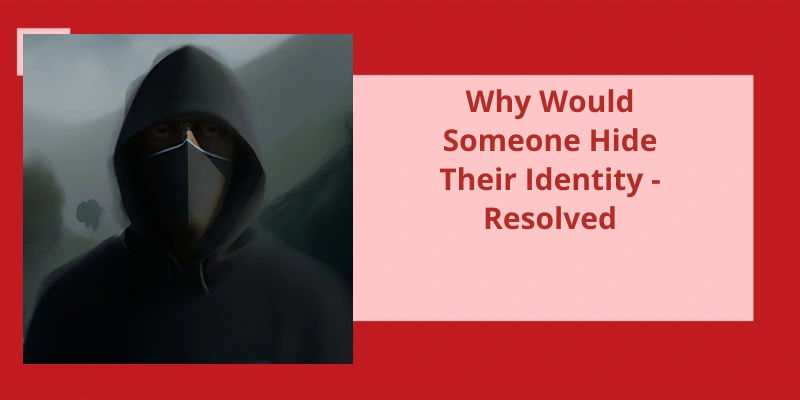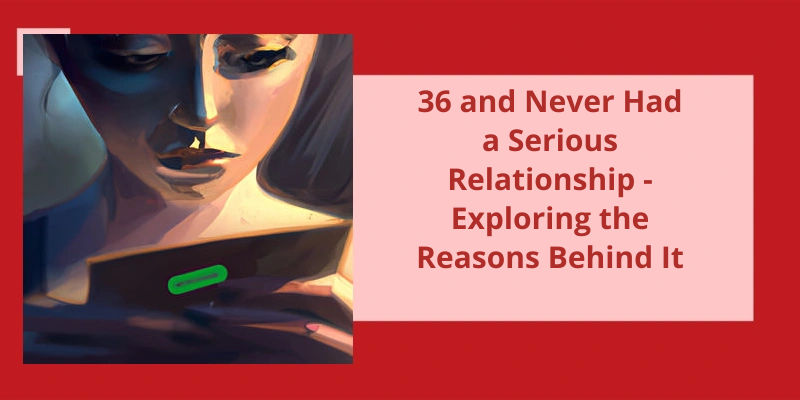In a world where information is readily accessible and personal privacy is increasingly threatened, the act of hiding one's identity has become both a pressing concern and a complex endeavor. From whistleblowers unveiling corruption to individuals seeking refuge from persecution, there exists a multitude of reasons why someone may feel compelled to conceal their true identity. This article aims to explore the various motivations behind such actions, shedding light on the intricate web of circumstances and emotions that can lead an individual to shroud themselves in secrecy. By examining the intricacies of this phenomenon, we can gain a deeper understanding of the challenges faced by those who choose to hide their identity and contemplate the ethical and societal implications that arise in an age of transparency.
Is Hiding Your Identity Good?
Moreover, hiding our identity can come with various negative consequences. Firstly, it can hinder our ability to build genuine connections and form meaningful relationships. When we conceal our true selves, it becomes challenging for others to truly know and understand us. This lack of authenticity can create barriers and prevent us from forming genuine connections with others, leading to feelings of isolation and loneliness.
Additionally, hiding our identity can lead to a constant fear of being discovered or exposed. Living in a state of paranoia can be extremely exhausting and take a toll on our mental and emotional well-being. The constant pressure to maintain the facade can cause immense stress and anxiety, affecting our overall quality of life.
It may involve engaging in deceitful or fraudulent activities, which can ultimately lead to legal consequences. Furthermore, hiding ones identity can potentially harm others who may be impacted by the actions conducted under the concealed persona.
It’s crucial to find a balance between protecting ourselves and our privacy while also embracing authenticity and genuine connection with others.
The Psychology Behind Why People Choose to Hide Their Identity
There are several psychological reasons why people choose to hide their identity. Some individuals may hide their identity out of fear of judgment or rejection. They may feel more comfortable expressing themselves anonymously, away from the scrutiny of others. Hiding one’s identity can also be a way to protect oneself from potential harm or unwanted attention.
For others, anonymity offers a sense of freedom and liberation. It allows individuals to explore different aspects of their personality or engage in activities they might not feel comfortable doing under their real name. Anonymity can provide a safe space to express thoughts, opinions, and emotions without fear of consequences.
Additionally, some individuals hide their identity to maintain a sense of control over their personal information. In a digital era where privacy concerns are prevalent, maintaining anonymity can safeguard against potential exploitation or misuse of personal data.
Overall, the decision to hide one’s identity is deeply rooted in individual experiences, fears, and desires. It represents a means of self-protection, self-expression, and maintaining control in an increasingly interconnected world.
In addition to being commonly referred to as an “anonymous” individual, someone who hides their identity may also be known as a pseudonymous person. Whether they choose to conceal their true identity for personal, professional, or privacy reasons, these individuals often go to great lengths to maintain their anonymity.
What Do You Call a Person Who Hides His Identity?
When discussing individuals who hide their identity, the term commonly used is “anonymous.”. These individuals intentionally conceal their true identity for various reasons. Some may choose to do so to protect their privacy and maintain a sense of security in an increasingly digital world. Others may hide their identity in order to engage in activities that would be frowned upon or even illegal in society. In these cases, anonymity provides them a sense of freedom from potential consequences and retribution.
Furthermore, some people choose to become anonymous as a form of resistance or protest. By concealing their identity, they can express themselves freely without fear of reprisal or punishment. This has been particularly relevant in oppressive regimes or societies where speaking out against the government or other powerful entities can have severe consequences. Anonymity allows individuals to participate in activism and advocate for change without jeopardizing their safety or well-being.
Cybercriminals often operate anonymously to carry out illegal activities such as hacking, identity theft, or spreading malware. By hiding their true identity, they can evade capture and continue their illicit activities with minimal risk of being identified or apprehended.
While anonymity can be empowering and provide a necessary level of privacy, it can also cause harm. Some individuals abuse anonymous platforms to spread hate speech, misinformation, or engage in cyberbullying. The lack of accountability that anonymity provides can enable toxic behavior and foster a culture of online negativity. Balancing the benefits and drawbacks of anonymity is a complex challenge that society continues to grapple with in the digital age.
The Psychology Behind Anonymous Behavior: Explore the Reasons Why Individuals Choose to Hide Their Identity and the Motivations Behind Their Actions.
There are various reasons why individuals choose to hide their identity and engage in anonymous behavior. The psychology behind this phenomenon is multifaceted and can be influenced by a range of factors.
One of the main motivations behind anonymity is the desire for privacy and protection. In an increasingly digitized world where personal information can be easily accessed and exploited, some individuals prefer to conceal their identity to safeguard their personal details.
Furthermore, anonymity provides a sense of freedom to express oneself without the fear of judgment or consequences. People may be more inclined to share their thoughts, opinions, or engage in controversial discussions when they feel shielded by anonymity.
In certain situations, anonymity acts as a shield against social or professional repercussions. Whistleblowers, for example, often choose to remain anonymous to protect themselves from potential retaliation. Similarly, individuals participating in sensitive or illegal activities may hide their identity to avoid legal consequences.
Additionally, anonymity can serve as a way to explore different identities or personas. Online platforms allow people to create alter egos and experiment with different aspects of their personality, giving them a break from the limitations of their everyday lives.
In conclusion, the psychology behind anonymous behavior is complex and influenced by the need for privacy, protection, freedom, and personal exploration. Understanding these motivations helps shed light on why someone would choose to hide their identity.
Hiding one’s identity online through anonymity or identity shielding can offer individuals a protective layer of privacy, allowing them to shield their identifying information. However, this anonymity can also present challenges when it comes to holding them accountable for their actions and statements in the online realm.
What Does It Mean When You Hide Your Identity?
When someone chooses to hide their identity, it often signifies a desire for privacy and the need to keep certain aspects of their life undisclosed. Anonymity and identity shielding offer individuals the opportunity to cloak their personal information, such as their real name, location, or other identifying details, on the internet. This can be especially important in an era where personal information can be easily exploited or used against individuals.
Moreover, hiding ones identity can lead to a lack of transparency and trust in online interactions. When engaging with others online, knowing someones true identity can add a layer of authenticity and allow for more meaningful connections. Without this knowledge, it becomes challenging to discern the intentions and credibility of individuals, making it harder to form genuine relationships or trust online content.
It’s crucial to find a balance that respects individual autonomy while fostering a positive and responsible online environment.
In the realm of fiction and cinema, one often encounters a character who leads a double life, hiding their true identity behind a secret alter ego. This concept, known as a secret identity, captivates audiences and adds a layer of intrigue to storytelling. But what exactly do we call someone with a secret identity? This article will explore the different terms used to describe these enigmatic figures, from cryptonyms and incognitos to covers and alter egos. Let’s delve into the world of those who live in the shadows.
What Do You Call Someone With a Secret Identity?
In the realm of fiction and superheroes, someone with a secret identity is often referred to as an alter ego. This alter ego allows individuals to lead a double life, with a public persona that’s known to the general public, and a private one that remains hidden from view. The decision to hide their identity is often driven by several factors, such as protecting their loved ones from potential harm or maintaining a sense of normalcy in their personal lives.
By keeping their true identity a secret, they can prevent adversaries from targeting their family and friends. This is especially true for superheroes, whose enemies often go to great lengths to uncover their real names and use that information against them. By assuming a secret identity, these individuals can maintain a degree of separation between their heroic actions and their personal relationships.
In some cases, individuals with extraordinary abilities or responsibilities may wish to lead a regular life outside of their public persona. By adopting a secret identity, they can have the freedom to go about their daily routines without the constant attention or pressure that comes with fame or notoriety. This allows them to have personal relationships and experience the joys and challenges of everyday life, separate from their extraordinary exploits.
Moreover, hiding ones identity can also be a means of guarding against judgement or prejudice. In a world where public opinions and perceptions can be harsh, some individuals may choose to conceal their true selves to avoid criticism or discrimination. Whether it involves concealing aspects of their personal lives or assuming a different identity altogether, this act of self-preservation enables them to navigate the world with greater autonomy and control, unaffected by the biases and scrutiny of others.
Lastly, the notion of a secret identity can add an element of mystery and intrigue to a persons character. It creates an enigma that captivates the imagination of others, making them question who lies beneath the facade. It adds depth to their story and allows for character development as they balance the complexities of their hidden lives with their public personas. Ultimately, the decision to conceal ones true identity is often a multifaceted one, driven by a combination of personal reasons, self-preservation, and the desire to protect those they hold dear.
Conclusion
In today's digital age, it’s become increasingly common for individuals to hide their identity for various reasons. From privacy concerns to avoiding harassment or maintaining a sense of mystique, there are numerous motivations behind this practice. The allure of anonymity allows individuals to freely express themselves without fear of judgment or repercussions. Striking a balance between personal privacy and authenticity is essential, as transparency plays a vital role in fostering healthy relationships and building a trustworthy online presence.






